|
|
|
Sort Order |
|
|
|
Items / Page
|
|
|
|
|
|
|
| Srl | Item |
| 1 |
ID:
143644
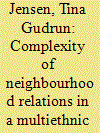

|
|
|
|
|
| Summary/Abstract |
This article examines the nature of coexistence in a multiethnic social housing project in Copenhagen, focusing on neighbourhood relations between majority Danes and ethnic minorities. Despite the general assumption that ethnic majorities and minorities have no neighbourhood relations, this case study reveals multifarious ways of relationship-making. Whereas the residents tended to emphasise separation between ethnic groups, their everyday practices indicated coexistence. These contrasts reflect the residents’ affirmations and contestations of the public national discourse about immigration, social integration and urban life. The variety of neighbourhood practices illustrates a complex social reality characterised by contrasts and ambivalences that represent different orders of identification and interaction and constitute coexisting tendencies of boundary maintenance and conviviality.
|
|
|
|
|
|
|
|
|
|
|
|
|
|
|
|
| 2 |
ID:
143641
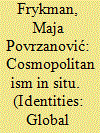

|
|
|
|
|
| Summary/Abstract |
This article explores an in situ approach to the emergence of cosmopolitanism as domains of common interest and aspiration. Adopting a cosmopolitan lens that does not assume the central role of categories of diversity in structuring social relationships, the article captures the dialectics between the material place, which facilitates interactions and the social space created in the course of engaged practice in a specific urban setting. The cosmopolitan lens made visible the ways in which local and global concerns and dynamics of power are emplaced in Möllevången, in Malmö, Sweden, a neighbourhood defined by a local history of immigration and activism as well as by the globe-spanning processes of urban restructuring. Locally organised cultural and political events and initiatives promote a sense of belonging to the neighbourhood and conjoin particular and universal commitments towards environmental issues, human rights, equality and social justice.
|
|
|
|
|
|
|
|
|
|
|
|
|
|
|
|
| 3 |
ID:
143640


|
|
|
|
|
| Summary/Abstract |
This article contributes to the discussion of the everyday sociabilities that arise between migrant newcomers and local urban residents. We highlight the proximal, workplace and institutionally based social relations that newcomers and locals construct through finding domains of commonality, noting that in such instances differences are not constituting factors for the development of urban sociabilities. The urban sociabilities we describe emerge within the contingencies of a disempowered city in which all residents face limited institutional support and social or economic opportunities. Concepts of multiscalar displacements and emplacements are highlighted as useful for setting aside a communitarian bias in urban and migration studies and analysing urban sociabilities in ways that situate migrants within discussions of urban social movements.
|
|
|
|
|
|
|
|
|
|
|
|
|
|
|
|
| 4 |
ID:
143639
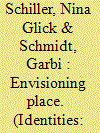

|
|
|
|
|
| Summary/Abstract |
This special issue focuses on ‘ways of seeing’ the city and raise questions about current dominant epistemological frameworks for understanding the urban-based sociabilities of people whom policy-makers and researchers frequently speak about as foreign, diverse and requiring integration. Read together, the articles contribute to an emerging relational social science by approaching urban sociabilities through four interrelated parameters: (1) a concept of place-making situated within trajectories of differential and multiscalar power; (2) a discursive analysis of narratives and silences, including those about diversity and cultural difference, formulated by actors within different scales of power; (3) an analysis of how different temporalities make visible or invisible the presence, agency and interconnection of various actors engaged in city-making; and (4) a re-engagement with the notion of ‘the social’, so that diversity, variation, mobility and conflict are seen as aspects of all urban social life, and not exclusively an attribute of ‘the other’.
|
|
|
|
|
|
|
|
|
|
|
|
|
|
|
|
| 5 |
ID:
143643
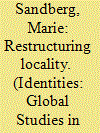

|
|
|
|
|
| Summary/Abstract |
Taking cities as analytical entry points for investigating practice, identity and place-making, this article explores the differential restructurings of locality in the twin cities of Görlitz and Zgorzelec on the German-Polish border. Drawing on ethnographic fieldwork, it shows how the local cities′ leaderships are attempting to wrestle the cities out of their downmarket positioning in the global economy. Deploying a performative research strategy of methodological relationalism, the article examines intersections between these cities′ strategies of situating local youth within urban regeneration and cross-border projects and local youth′s preferences for engaging in other kinds of place-making. By ‘seeing’ the cities in border regions through practices of place-making within the multiscalar processes of urban regeneration, new insights about ‘place’ are generated in which city branding is not the only kind of local restructuring to be acknowledged.
|
|
|
|
|
|
|
|
|
|
|
|
|
|
|
|
| 6 |
ID:
143645
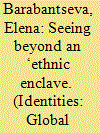

|
|
|
|
|
| Summary/Abstract |
Research on Chinatowns stresses the spatial aspects of their production as communal urban spaces. This is particularly evident in the prevailing rhetoric of ethnic ‘enclaves’ that is common in the literature on Chinatowns. This article stresses the importance of taking into account the temporal dimensions of the examinations of space and migrants’ relationships with the city. The argument maintains that, although Manchester Chinatown incorporates many layers of time, only some of them are acknowledged. This view ties both space and people into a particular temporality that is associated with a predetermined culture and tradition. The article shows how relocation from Chinatown to a non-ethnically defined urban area makes it possible for community organisations to depart from the essentialised ethnic, cultural, and social associations produced through dominant understandings of migrant communal space.
|
|
|
|
|
|
|
|
|
|
|
|
|
|
|
|
| 7 |
ID:
143642
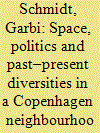

|
|
|
|
|
| Summary/Abstract |
This article responds to the need for a cautious use of the concepts of diversity and social cohesion in migration research. Presently missing in the literature is a historicisation and contextualisation of these concepts that can highlight the heterogeneity of diversity. In our investigation of the cities and neighbourhoods in which migrants settle and how migrants affect these neighbourhoods, it is important to ask whether the diversity of today is significantly different from the diversity a hundred years ago. To provide the missing perspectives, I offer a situated historical analysis of empirical data and ethnographic fieldwork in Nørrebro, a neighbourhood of the Danish capital, Copenhagen. Situating the contemporary heterogeneous characteristics of cities and neighbourhoods within a local history of diversity is useful for our understanding of past and contemporary social solidarities that underlie the perceptions of ‘otherness’ and the changing implications of the focus on immigrant identity.
|
|
|
|
|
|
|
|
|
|
|
|
|
|
|
|
|
|
|
|
|